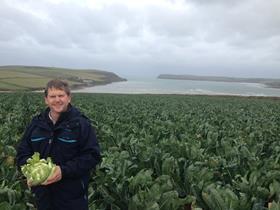
A recent glut in cauliflower supply has caused prices to plummet and sparked fears of a gap in the market for early next year. But the warm temperatures that prompted crops to ripen early is part of a longer-term shift in weather patterns that will cause more permanent changes in winter vegetable sourcing.
With temperatures as high as 13 degrees recorded in key growing region Cornwall over the past week, this is the second year in a row that the UK has had an “unseasonably warm” autumn and winter. As a result, FPJ was told that last year some British supermarkets expanded their overseas programmes on some lines, hoping for better consistency from Spanish suppliers.
But Spanish growers have also been hit by warm temperatures meaning crops are maturing ahead of schedule, and coupled with low demand in Europe, has led several Almerian producer organisations to warn that prices have dropped sharply.
Earlier this year, low rainfall in eastern areas of the UK led to issues on broccoli supply, and saw retailers turning to Cornwall and Scotland for the key summer period between May and July. Managing director of Cornish vegetable grower Southern England Farms (SEF), Greville Richards, explains: “For the eastern regions, like Lincolnshire, people are getting concerned about the lack of rainfall in summer months – it’s becoming a much more spoken about topic.
“This year, no rainfall from the end of May, June and July really hampered yields, especially on broccoli, so for Cornwall and Scotland we saw more orders coming our way. Retailers are now spreading their risk on most lines.
“We are seeing that retailers are taking a very geographical approach, rather than always taking the cheapest.”
Commercial director at Lincolnshire grower TH Clements, Richard Mowbray, says many crops have been affected by the warmth. “Sprouts are bigger but there is more disease than usual so yields are down slightly,” he explains. “The sprout season is earlier than it should be, so we desperately needed the cold weather to slow them down so that we’re in good shape for Christmas.
“Broccoli is our biggest crop, along with cauliflower. We’ve just about finished broccoli – the season had a late start and late finish, and the crop was good quality. It wasn’t quite as strong as last year but it is still the most popular vegetable. Kale is doing well and we’re planting more on that. Brussels sprouts seem to be trending at the moment so we’re going to look at that next year. Cauliflower seems to be making a comeback – there is lots of interest from chefs and there is lots of NPD such as cauliflower rice.”
Changing weather patterns and sourcing plans are opening doors for new suppliers to the UK winter vegetable market. Belgian vegetable co-operative REO Veiling is one supplier that believes it can compete with its Dutch neighbours for a greater share of the UK market.
Sales manager Tom Premereur explains: “Dutch companies are well known for their export towards the UK, where we as Belgian suppliers can also supply a lot of these products. We are much closer, so that is why we will put some effort this winter in exploring the UK market.
“Our main product is leek, a big product towards the UK. We rely a lot on export of our leek, but the percentage of export depends on the winter in the importing countries. Our region, West Flanders, has the advantage that the temperature is on average two degrees warmer than the rest of Europe. That is why the leek production has grown in our region during the last 20 years, and we have leek in periods where other regions are not able to harvest.”
REO markets its leeks under the Flandria label, and has recently launched a new carton with an opening in the middle and a single-use Flandria banner to prevent imitation. White cabbage is another key export to the UK from Belgium, says Premereur, while the celeriac market is also growing.
He adds: “It looks like it is going to be a good market this winter. In Poland a lot of open-air production has stayed very small because of a long period of drought in the summer.”
Back in the UK, Richards says SEF is seeing “very good growth” and he is particularly pleased with the courgette season after extending it by five weeks until mid October.
“We are not foreseeing any supply issues over Christmas. The crops are looking very good,” he says. “Next year we’re starting to grow kale and branded broccoli Bellaverde for the first time next year. The business as a whole is seeing some very strong growth, and it’s encouraging that this is in existing lines. We’ve seen huge growth on broccoli and all the cabbage lines.”
Next week’s Paris Climate Talks are a reminder that the planet’s climate is changing irrevocably – the effect is already being felt in vegetable and wider fresh produce supply, and there will only be more of the same in the future.



